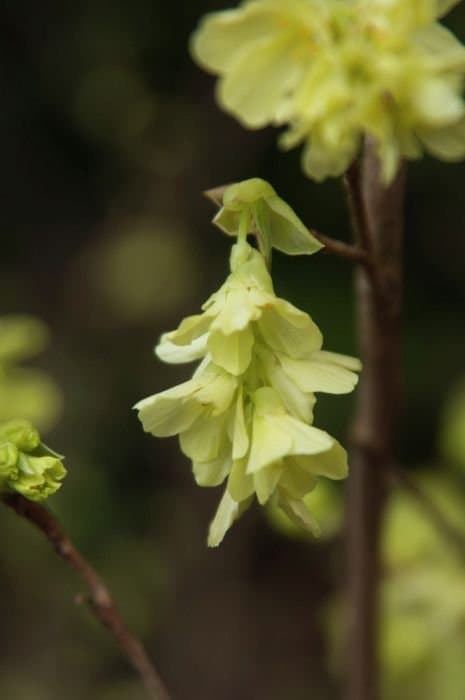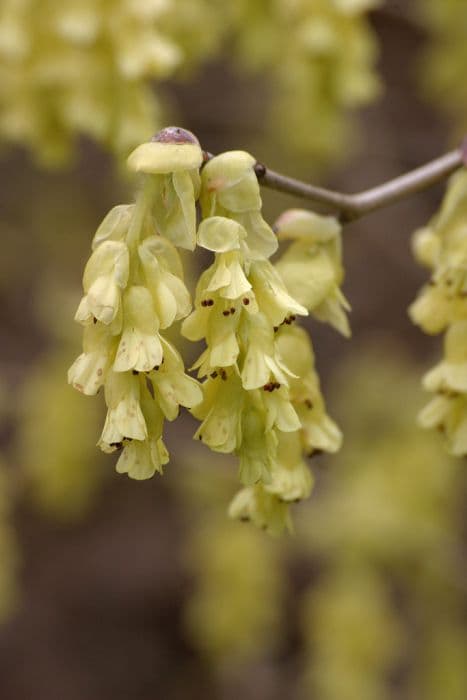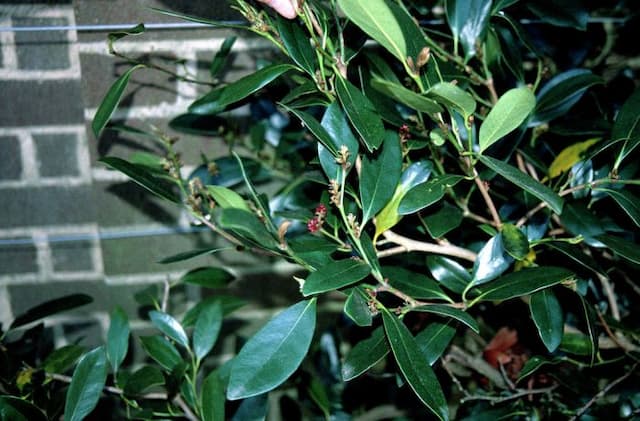Witch hazel 'Feuerzauber' Hamamelis × intermedia 'Feuerzauber'

ABOUT
Witch Hazel 'Feuerzauber', commonly known as Fire Charm Witch Hazel, is a deciduous shrub known for its unique flowering and foliage. It blooms in late winter to early spring, producing vibrant red to orange, fragrant flowers. These ribbon-like petals emerge on bare branches, creating a striking contrast against the winter landscape. In the fall, the leaves turn a beautiful array of colors, ranging from yellow to red, adding to its ornamental appeal.
About this plant
 Names
NamesFamily
Hamamelidaceae
Synonyms
Witch Hazel 'Feuerzauber', Fire Charm Witch Hazel
Common names
Hamamelis × intermedia 'Feuerzauber'
 Toxicity
ToxicityTo humans
Fire Charm Witch Hazel is not known to be toxic to humans. There are no reported cases of poisoning or adverse effects from handling or being in close proximity to this plant. It is commonly used in gardens and landscapes for its decorative properties.
To pets
Fire Charm Witch Hazel is not known to be toxic to pets. It is considered safe for planting in gardens where pets may have access. However, as with any plant, it is always advisable to monitor pets and prevent them from ingesting large amounts of plant material.
 Characteristics
CharacteristicsLife cycle
Perennials
Foliage type
Deciduous
Color of leaves
Green
Flower color
Red
Height
10-15 feet (3-4.5 meters)
Spread
10-15 feet (3-4.5 meters)
Plant type
Shrub
Hardiness zones
3
Benefits
 General Benefits
General Benefits- Ornamental Value: Adds aesthetic appeal to gardens with its unique red flowers and vibrant fall foliage.
- Wildlife Attraction: Attracts birds and beneficial insects, supporting biodiversity.
- Shade Provider: Can offer shade in garden settings due to its size.
- Seasonal Interest: Provides year-round interest with distinct flowering in winter and colorful leaves in fall.
- Privacy Screen: Due to its size and spread, it can be used as a natural privacy barrier in gardens.
 Medical Properties
Medical PropertiesThis plant is not used for medical purposes.
 Air-purifying Qualities
Air-purifying QualitiesThis plant is not specifically known for air purifying qualities.
 Other Uses
Other Uses- Landscape Focal Point: Its unique winter blooms and vivid fall colors make it an ideal focal point in landscape design.
- Winter Garden Interest: Provides color and visual interest in winter gardens when most plants are dormant.
- Photography Subject: Often used as a subject in nature and garden photography due to its distinctive appearance.
- Educational Tool: Used in botanical studies and educational programs to demonstrate plant adaptation and seasonal changes.
- Cultural Significance: Holds value in certain cultures for its unique flowering time and is sometimes used in cultural festivals or garden shows.
- Bee-Friendly Plant: Attracts bees during its blooming period, supporting local pollinator populations.
- Windbreak: When planted in groups, can act as a windbreak due to its size and density.
- Seasonal Arrangements: Branches with blooms can be used in floral arrangements, especially in winter.
- Habitat Creation: Provides shelter and habitat for small wildlife like birds and beneficial insects.
- Seasonal Marker: Acts as a natural indicator of seasonal change, especially the transition from winter to spring.
Interesting Facts
 Feng Shui
Feng ShuiThe Witch Hazel 'Feuerzauber' is not used in Feng Shui practice.
 Zodiac Sign Compitability
Zodiac Sign CompitabilityThe Witch Hazel 'Feuerzauber' is not used in astrology practice.
 Plant Symbolism
Plant SymbolismWitch Hazel 'Feuerzauber' is often symbolically associated with resilience and survival, as it blooms in late winter, signifying hope and renewal. The vibrant red flowers can also symbolize passion and energy, making it a plant that represents transformation and new beginnings.
 Water
WaterThe Witch Hazel 'Feuerzauber' should be watered deeply and regularly during its first growing season to establish an extensive root system. Once established, it requires less frequent watering, but it's important to maintain moist soil. Watering amounts can vary, but generally, providing about an inch of water weekly, either through rainfall or manual watering, is sufficient. During dry spells, extra watering may be necessary.
 Light
LightWitch Hazel 'Feuerzauber' thrives in full sun to partial shade. It performs best when it receives at least four to six hours of direct sunlight daily. If grown in too much shade, the plant may not flower as prolifically. A location that offers morning sun and afternoon shade is ideal for this plant.
 Temperature
TemperatureWitch Hazel 'Feuerzauber' is adaptable to a range of temperatures and is hardy in most temperate climates. It can withstand winter lows down to -20°F and summer highs up to 90°F. Ideal growing temperatures are between 60°F and 75°F. Avoid extreme heat or cold as it can stress the plant.
 Pruning
PruningPrune Witch Hazel 'Feuerzauber' in late winter or early spring before new growth begins. Remove any damaged or crossing branches to maintain a healthy structure. Pruning is also an opportunity to shape the plant, but heavy pruning is not necessary as this plant naturally forms an attractive shape.
 Cleaning
CleaningAs needed.
 Soil
SoilWitch Hazel 'Feuerzauber' prefers well-draining soil that is rich in organic matter. The ideal soil pH for this plant is slightly acidic to neutral, ranging from 5.5 to 7. Amend the planting area with compost to improve soil structure and nutrient content. Good drainage is crucial to prevent root rot, so avoid heavy, clay soils unless amended to improve drainage.
 Repotting
RepottingWitch Hazel 'Feuerzauber' is typically grown in the ground rather than containers due to its size. If you must grow it in a container, repot every 2 to 3 years to refresh the soil and provide more room for growth. Choose a pot that is slightly larger than the current one and ensure it has adequate drainage holes.
 Humidity & Misting
Humidity & MistingWitch Hazel 'Feuerzauber' is tolerant of a range of humidity levels and does well in typical outdoor humidity conditions. It does not have specific humidity requirements, making it adaptable to most environments. Avoid extremely dry conditions, which can cause the leaves to dry out and drop.
 Suitable locations
Suitable locationsIndoor
Growing Witch Hazel 'Feuerzauber' indoors is challenging due to its size and preference for outdoor conditions. If you attempt it, provide bright, indirect light and ensure good air circulation. It's best suited to a sunroom or a large space with ample light.
Outdoor
Plant Witch Hazel 'Feuerzauber' in a location that receives full sun to partial shade. It is adaptable to various soil types but thrives in well-drained soil rich in organic matter. Mulch around the base to retain moisture and regulate soil temperature.
Hardiness zone
5-8 USDA
 Life cycle
Life cycleWitch Hazel 'Feuerzauber' begins its life as a seed, which after germination, grows into a seedling. The seedling phase is followed by a juvenile period where the plant establishes its root system and begins to grow leaves. As it matures, it enters the vegetative stage, growing larger and developing a more robust structure. Flowering occurs annually, typically in late winter to early spring, with unique, fragrant flowers. After pollination, the plant produces seeds, completing its reproductive cycle. This plant is a perennial, so it continues this cycle for many years, growing larger and more established with each passing season.
 Propogation
PropogationPropogation time
Spring to summer
Hamamelis × intermedia 'Feuerzauber', commonly propagated by softwood cuttings, is best done in late spring or early summer. Select healthy, new growth and cut 4-6 inch long stem segments. Remove the lower leaves and dip the cut end in rooting hormone. Plant the cuttings in a pot filled with a mix of peat and perlite, ensuring good contact with the soil. Cover with a plastic bag to maintain humidity and place in a warm, bright area without direct sunlight. Keep the soil consistently moist but not waterlogged. Roots typically develop in 4-6 weeks. After rooting, gradually acclimate the young plants to outdoor conditions before planting in the garden.
 Pests
PestsSpider mite, Scale insects, Aphid
 Diseases
DiseasesPowdery mildew, Leaf spot, Rust









